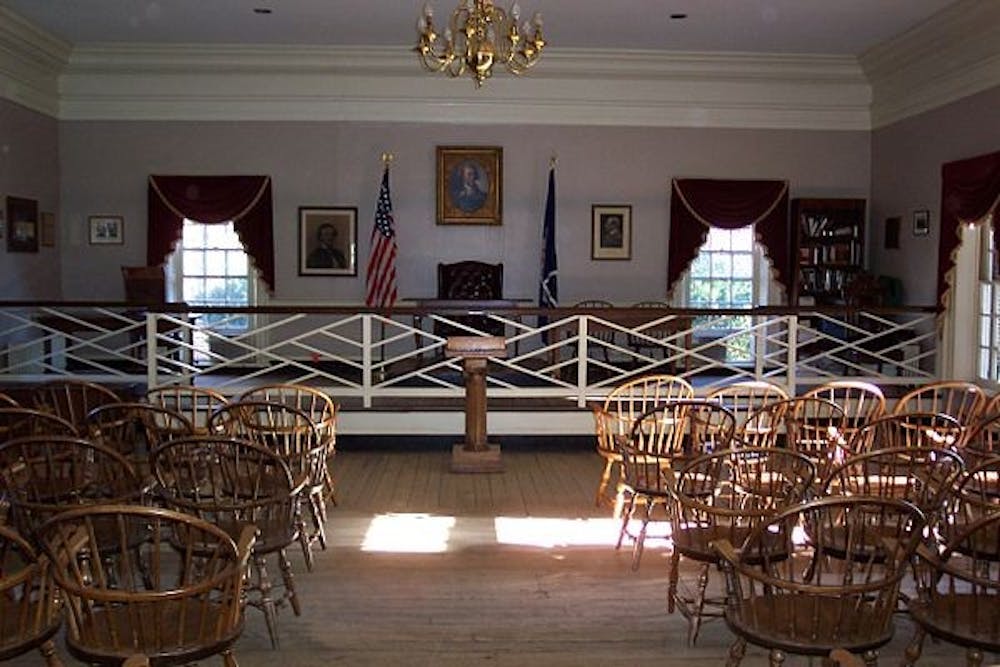Trump’s America feels like a brave new world. For too long, American politics has been characterized by hyper-partisanship — the Pew Research Center found that ideological divisions between Republicans and Democrats reached record levels under the Obama administration. Since the election of President Donald Trump, those divisions have grown even wider and even more appalling to those wishing to engage in meaningful and respectful political discourse. Although Americans in general have trouble talking to each other, students at the University do not. Literary and debating organizations on Grounds do the important work of bringing together disparate ideological communities and hosting respectful, productive political dialogues. Students should engage with organizations like the Jefferson, Washington and Roosevelt Societies to embrace ideological diversity and practice constructive debate.
College literary societies have played an important role in the history of American higher education. As the dominant social organizations before the development of Greek Life, literary societies like the University of Georgia’s Demosthenian Society or Georgetown’s Philodemic Society helped develop social and intellectual culture at universities. While the Jefferson Literary and Debating Society and the Washington Literary Society and Debating Union are two of the University’s oldest organizations, we have a number of newer literary societies that have emerged in recent years, including the Roosevelt Society, the Burke Society and the Benjamin Franklin Society.
Although they’ve been around a long time, college literary societies maintain their relevance today through their commitment to ideological diversity. While many groups at the University promote discussion or political action, few so clearly articulate the goal of bringing together students who have different values. At the beginning of each semester, members of the Jefferson Society affirm in an oath that “ideas springing out of solitary observation and reflection are seldom in first instance correct” and that “the faculties of the mind are excited by collision.” In the midst of the country’s current polarization, these are rare points of view. Few Americans, it seems, are excited by the collision of competing ideas.
Take controversial writer and activist Asra Nomani’s visit to the University last semester as an example of the persistent salience of college literary societies. Nomani’s speech was entitled “Make Islam Great Again,” and it was met with anything but a room in agreement. But that’s the thing –– the speech was met. Members of the University listened to, engaged with and debated Nomani’s ideas, whether they agreed with them or not.
Nomani isn’t always received so smoothly. In 2015, she spoke at Duke University, only after being disinvited and then re-invited. This past March, she was nearly disinvited from an event at Georgetown. Nomani is controversial for her critiques of Islam and support of Trump, and she’s a flash point for college campuses like Milo Yiannopoulos and Anne Coulter were for University of California, Berkeley. Charles Murray and Heather Mac Donald sparked similar conflicts at Middlebury and Claremont McKenna, respectively.
It’s important to note that not all controversial speakers are equal, and this argument should not be misconstrued as a blanket justification for hosting hate speech. People like Richard Spencer who incite violence should never be permitted to speak at universities. Similar arguments might be made for Milo Yiannopoulos and other speakers who threaten the safety and security of collegiate environments.
While Asra Nomani’s perspectives on Islam are often insultingly overgeneralized, she does not incite violence in her speeches. The Jefferson Society’s ability to host her for an evening of dialogue cut through the politicization of free speech on college campuses and allowed the University to have a meaningful conversation about Nomani’s views. Hosting Nomani also made her available for a form of public critique and commentary –– in the form of a Q&A session –– which would be difficult to achieve in other venues.
Our literary societies’ commitment to productive dialogue doesn’t end at speaker events. In speeches, debates and other events, groups like the Jefferson, Washington, Roosevelt, Burke and Benjamin Franklin Societies are opening opportunities for students to engage with diverse opinions. Students should take advantage of the opportunities afforded them by the University’s array of literary societies, exposing themselves to opinions with which they disagree and having the conversations that the rest of the nation also needs to be having.
Jack Chellman is an Opinion columnist for The Cavalier Daily. He can be reached at opinion@cavalierdaily.com.







